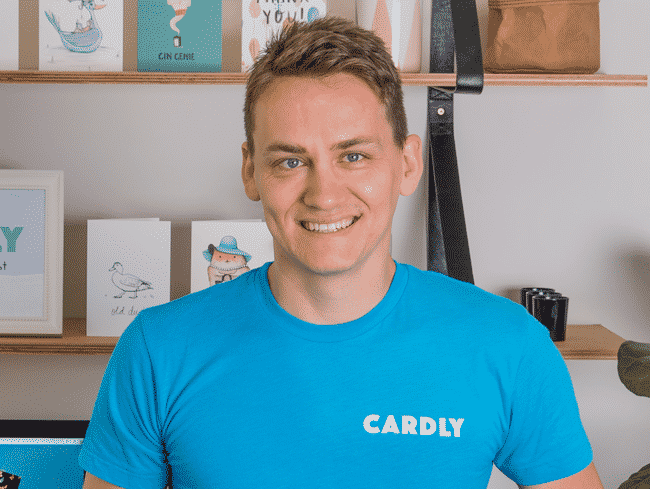We spoke to Patrick Gaskin, Co-Founder of personalised mail service Cardly as the company is set to take a bigger bite out of the global £14+ billion greeting card and direct mail market with its relaunch in the UK.
The UK public spends nearly £2 billion on greeting cards annually, and Cardly is projecting to send more than 500,000 cards, postcards and letters in the next 12 months.
What do you currently do at Cardly?
I am the CEO and founder, which sounds quite grandiose. In reality, as a startup that is growing rapidly but not taken on much funding, we are still a small team and I wear many hats. I look after our finances, oversee our marketing, guide our product development and even support our sales and service functions. This means that I talk to our users daily, which is actually very useful as it keeps focus on solving their biggest problems and making our product great.
Cardly services both business and consumer users, which is quite unique, but our focus and objective is the same – to help people create highly personal connections using physical handwritten mail.
What was the inspiration behind the business?
My family owned a chain of news agencies that sold greeting cards and I worked in the business for almost a decade.
I noticed two things from being closely involved in the Greeting Card industry. Firstly, I became aware that greeting cards play an important role in society, because they allow people to express how they really feel about those closest to them – sometimes more than they would be comfortable verbalising. And secondly, that the industry was unfair to artists and wasteful.
Having worked in the digital space for a decade, I came back to the greeting card industry and thought it could be done better. We were aware that some large players already existed, but they weren’t focused on what and how people wrote in the cards, this is something we are obsessed about. We made it possible for people to write and doodle in cards like they do in a real card. That, combined with an amazing and well rewarded independent artist community and a zero waste model, formed the foundation for Cardly. From our initial MVP we started to be approached by businesses looking to leverage what we built. So we quickly gave businesses the ability to send and schedule handwritten mail as easily as they might send an email campaign.
What defines your way of doing business?
Always doing better. As a business striving to disrupt a large and established industry, we want to always do better. For example, we looked at how physical greeting cards are manufactured and sold. They are often manufactured in China, shipped around the world, then distributed into retail outlets where less than half sell and the rest are pulled back out of the stores and pulped. It is very wasteful. In contrast, we print and post locally to where someone is looking to send to. So a card being sent to the UK by someone in the US is printed and posted in the UK. We also only print a card when ordered, so there is no wastage. We only use FSC certified or recycled stocks and we plant five trees for every 100 cards we send. So, we think, that makes us much better than the traditional model. But we’re focused on making further improvements and never standing still.
What do you admire?
I am in awe of people who make a positive difference in the world. I have a great example in my own home. My wife is a nurse and she is always trying to make things better for others.
I think the last year and the pandemic has really highlighted the importance of being focused on making the world a better place. Whilst we aren’t doing anything as important as healthcare, we have helped thousands of people stay connected when it hasn’t been possible to be together this year and that makes me very proud.
Looking back, is there anything you would have done differently?
With perfect 20/20 hindsight, I would have done lots of little things slightly differently when starting Cardly. But the biggest thing would be finding people with the same passion and drive as early as possible when building a team. The right people make such a positive difference and can move a business forward more quickly than anything else.
What advice would you give to someone starting out?
A startup is a very challenging pathway. Resilience is required for the journey, but it is important to remember that you are not your startup. Defining your self worth based on the success of your venture can be harmful for your mental wellbeing and it isn’t fair. Sometimes things will go wrong and they will be outside of your control. Be passionate about what you do, but don’t forget what really matters in life.


